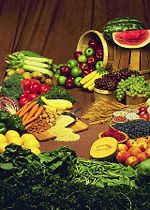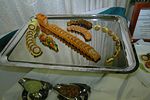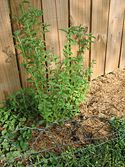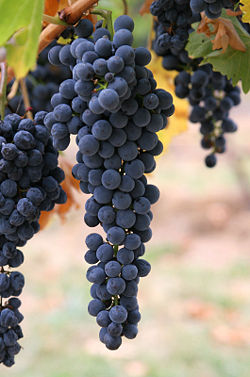Portal:Food
2008/9 Schools Wikipedia Selection. Related subjects: Food; Portals
|
Food is any substance, usually composed primarily of carbohydrates, fats, water and/or proteins, that can be eaten or drunk by an animal for nutrition or pleasure. Items considered food may be sourced from plants, animals or other categories such as fungus. Ranching, and fishing, hunting, foraging and other methods are ways to obtain food. Most traditions have a recognizable cuisine, a specific set of cooking traditions, preferences, and practices, the study of which is known as gastronomy. Many cultures have diversified their foods by means of preparation, cooking methods and manufacturing. This also includes a complex food trade which helps the cultures to economically survive by-way-of food, not just by consumption. Many cultures study the dietary analysis of food habits. While humans are omnivores, religion and social constructs such as morality often affect which foods they will consume. Food safety is also a concern with foodborne illness claiming many lives each year. In English, the substance food is often used metaphorically or figuratively, as in food for thought.
The Paleolithic diet (or Paleolithic nutrition), also popularly known as the paleo diet (var.: paleodiet), caveman diet, Stone Age diet and hunter-gatherer diet, is a dietary regimen which seeks to mimic the diet of wild plants and animals that humans habitually consumed during the Paleolithic, a period of about 2.5 million years duration that ended around 10,000 years ago with the development of agriculture.
Based upon commonly available modern foods, the Paleolithic diet consists mainly of lean meat, fish, vegetables, fruit, roots and nuts, and excludes grains, legumes, dairy products, salt, refined sugar and processed oils. First popularized in the mid 1970s by a gastroenterologist named Walter L. Voegtlin, this nutritional concept has been expounded and adapted by a number of authors and researchers in several books and academic journals. Building upon the principles of evolutionary medicine, it is based on the premise that modern humans are genetically adapted to the diet of their Paleolithic ancestors and that human genetics have scarcely changed since the dawn of agriculture, and therefore that an ideal diet for human health and well-being is one that resembles this ancestral diet. This dietary approach is a controversial topic amongst nutritionists and anthropologists. Advocates argue that modern human populations subsisting on traditional diets similar to those of Paleolithic hunter-gatherers are largely free of diseases of affluence, and that such diets produce beneficial health outcomes in controlled medical studies. Supporters point to several potentially therapeutic nutritional characteristics of preagricultural diets. Critics of this nutritional approach have taken issue with its underlying evolutionary logic, and have disputed certain dietary prescriptions on the grounds that they pose health risks and may not reflect the features of ancient Paleolithic diets. It has also been argued that such diets are not a realistic alternative for everyone, and that meat-based diets are not environmentally sustainable.
French toast (or "poor knights") is a common breakfast item made by frying an egg batter soaked piece of bread. French toast was developed as a way to use day-old stale bread. Lacking day-old bread, toasting your bread lightly can help it absorb more of the egg and milk batter. French toast is usually served with toppings similar to those used for pancakes, waffles, and toast.
Stevia is a genus of about 150 species of herbs and shrubs in the sunflower family ( Asteraceae), native to subtropical and tropical South America and Central America. The species Stevia rebaudiana Bertoni, commonly known as sweetleaf, sweet leaf, sugarleaf, or simply stevia, is widely grown for its sweet leaves. As a sugar substitute, stevia's taste has a slower onset and longer duration than that of sugar, although some of its extracts may have a bitter or licorice-like aftertaste at high concentrations.
With its extracts having up to 300 times the sweetness of sugar, stevia has garnered attention with the rise in demand for low-carbohydrate, low-sugar food alternatives. Stevia also has shown promise in medical research for treating such conditions as obesity and high blood pressure. Stevia has a negligible effect on blood glucose, even enhancing glucose tolerance; However, health and political controversies have limited stevia's availability in many countries; for example, the United States banned it in the early 1990s unless labeled as a supplement. Stevia is widely used as a sweetener in Japan, and it is now available in the US and Canada as a dietary supplement, although not as a food additive. Rebiana is the trade name for a stevia-derived sweetener being developed jointly by The Coca-Cola Company and Cargill with the intent of marketing in several countries and gaining regulatory approval in the US and EU. Truvia is Cargill's consumer brand of Rebiana-based sweetener.
Alton Brown (born 30 July 1962 in Los Angeles, California, United States) is an American food personality, cinematographer, author, and actor. He is the creator and host of the Food Network television show Good Eats, the miniseries Feasting on Asphalt and the main commentator on Iron Chef America. Brown is also the author of several cooking how-to books and a regular contributor to Bon Appétit and Men’s Journal magazines.
He brings a knowledge and enthusiasm for the science of cooking and food, and a humorous approach to his shows. Bon Appétit magazine named him "Cooking Teacher of the Year" in 2004. Brown pronounces his given name "Al-ton" (instead of "All-ton"). Aglianico is a red wine grape grown in the Campania and Basilicata regions of Italy. It has also recently been planted in Australia, where it thrives in a predominantly sunny climate.In early Roman times, it was the principal grape of the famous Falernian wine which was the Roman equivalent of a First Growth wine today.
|







